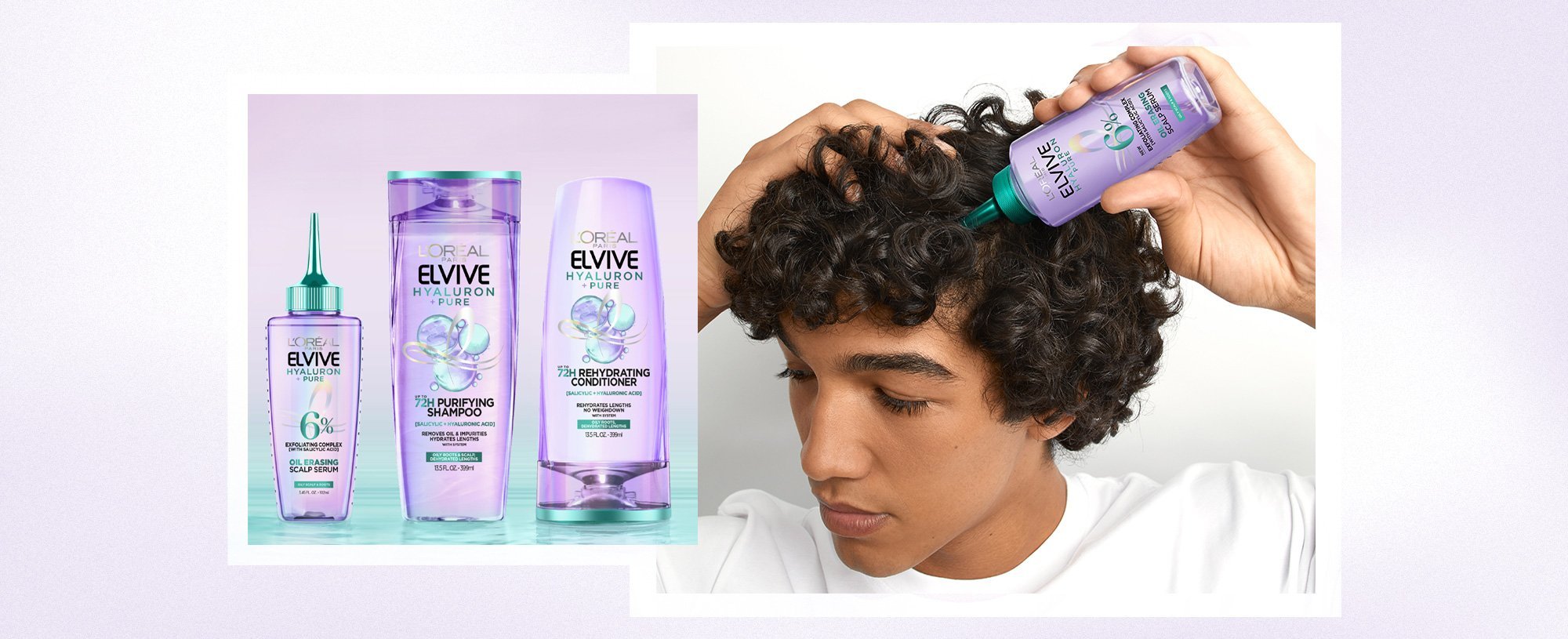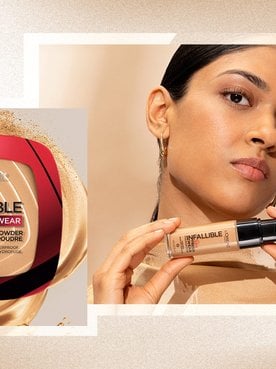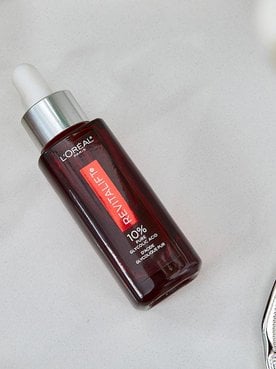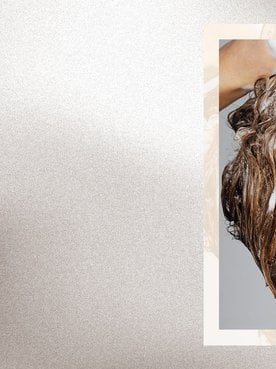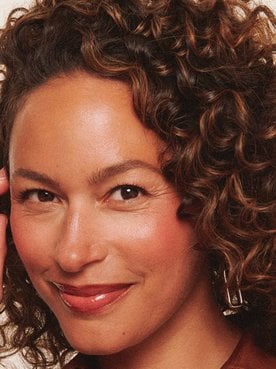Salicylic acid is a well-known skincare ingredient, but it’s worthy of being in your haircare routine, too. Products with salicylic acid can help combat an itchy scalp, break down product residue, and reduce excess oil to help promote a fresher-feeling scalp and healthier-looking hair. If you’re wondering how to use salicylic acid for hair, keep reading—we’re sharing all the need-to-knows ahead, plus details on our favorite salicylic shampoos, conditioners, and more.
What Is Salicylic Acid?
According to the Cleveland Clinic, salicylic acid is a beta-hydroxy acid (BHA), a type of chemical exfoliant. Like AHAs, BHAs can help remove dead skin that can clog pores or contribute to dullness and flaking. However, unlike AHAs, which are water-soluble, BHAs are oil-soluble. This means that they can help dissolve excess sebum, your skin's (and scalp’s) natural oil. That’s why you’ll commonly find this ingredient in products designed for those with oily or blemish-prone skin—though it can be used on your scalp and body, too.
What Are the Benefits of Salicylic Acid for Hair?
If you’re only familiar with this ingredient in the context of a skincare routine, you might be surprised to hear that you can use salicylic acid for hair. But remember, your scalp is skin, and your scalp has needs, many of which can be addressed with this hardworking acid. Below, learn more about the specific benefits of salicylic acid for hair that’ll have you reaching for products infused with this multi-tasking exfoliant.
1. Helps remove product buildup and excess oil
Many haircare products with salicylic acid help break down impurities—such as excess oil, sweat, and product residue—that can contribute to an itchy scalp and dull, flat hair. If you’re prone to buildup or have an oily scalp, adding a salicylic acid shampoo to your routine could be beneficial. We’re fans of the L'Oréal Paris Elvive Hyaluron + Pure Purifying Shampoo for Oily Hair, which helps remove up to 100 percent of residue and leaves the scalp feeling cleansed and refreshed. Pair it with the coordinating L’Oréal Paris Elvive Hyaluron + Pure Rehydrating Conditioner to help hydrate your lengths and ends without any weigh-down.

2. May help tackle dandruff
If you have a flaky, itchy scalp, know that salicylic acid and dandruff are a match made in (hair) heaven. Dandruff is a common skin condition characterized by an itchy scalp and a substantial buildup of dead skin. Research shows that salicylic acid dandruff products can help slough away that flaky skin, helping to prevent obvious snowfall-like dustings of dead cells on dark shirts. Removing the flaky buildup can go a long way toward relieving an itchy scalp. That being said, of you’re dealing with persistent flaking—or tweaking your haircare routine isn’t helping you find relief—consider scheduling a visit with your dermatologist.
3. Works to soothe an irritated scalp
If you have an itchy scalp but don’t have dandruff, that may be a sign that you’re dealing with a buildup of excess hair products or sebum on your scalp. It can also be a sign that you have hard water—in other words, water with a high concentration of minerals in it. To help remove hard water residue—without stripping your strands—turn to the the L’Oréal Paris EverPure Sulfate-Free Clarifying Shampoo with Antioxidants. This clarifying shampoo gently removes hard water and product buildup that could leave your scalp feeling irritated. Plus, its gentle, sulfate-free formula won’t strip your hair (or hair color).
That being said, if you have significant scalp irritation, get in touch with a dermatologist. They can help identify the root cause (pun intended) of your scalp woes and work with you to develop a plan that addresses your specific concerns.
Shop the Products
What Hair Types Should Use Salicylic Acid for Hair?
Anyone can benefit from using hair care with salicylic acid since all hair types can experience dandruff, product buildup, and an itchy scalp. It’s particularly beneficial for those with curly or coily hair who use a lot of styling products or with anyone who has an oily scalp. The key, as always, is to find the right products for your hair type, texture, and routine—and to use them as intended.
How To Use Salicylic Acid for Hair
If you’re interested in using salicylic acid for scalp issues or hair concerns, we’re sharing three tips on how to incorporate this helpful ingredient into your regular haircare routine.
Try a dedicated salicylic shampoo
While salicylic acid can be beneficial for your scalp and strands, it’s important to avoid using skincare products (like a salicylic acid serum, for example) on your hair and scalp. These types of products are typically formulated only for facial skin, and as such, shouldn’t be applied to the scalp. Instead, turn to a dedicated salicylic acid hair product, such as the L’Oréal Paris Elvive Hyaluron + Plump Hydrating Shampoo. The gentle formula helps cleanse the scalp and strands while locking in moisture for bouncy, shiny-looking hair. Plus, unlike clarifying shampoos—which are typically meant for weekly use—this hyaluronic acid-infused formula can be used daily (or anytime you lather up).
Focus on the scalp
When using a salicylic shampoo, make sure you apply the hair wash directly to your scalp, without coating the rest of your strands with the hair cleanser. According to the drying out your strands. Additionally, this is likely to give you the best results—excess product and sebum buildup tends to be concentrated at the scalp, and because salicylic acid is oil soluble, it’ll work to break down that oil to leave your hair looking and feeling cleaner. Thoroughly work your salicylic shampoo formula of choice into your scalp before massaging the suds down the length of your hair and rinsing to whisk away buildup.
To really help break down buildup at the source, you can use a targeted scalp treatment like L’Oréal Paris Elvive Hyaluron + Pure Oil Erasing Serum for Oily Hair. This pre-shampoo treatment helps minimize excess oils, hydrate the scalp and strands, and removes up to 100% of weighty product residue in as little as 20 minutes.

Shop the Products
Use salicylic acid for hair weekly
How often you use salicylic acid for your hair will depend on the specific product you’re using. Always follow the directions on the packaging to determine how frequently you should use that particular product. For the most part, if you’re looking to rebalance your scalp and use salicylic acid as a part of your routine, use products like a clarifying shampoo once a week or twice a week if you have an extremely oily scalp. Washing your hair too frequently (with salicylic shampoos or even your regular shampoo) can dehydrate your hair and skin, leading to an itchy scalp and dull-looking hair.
Always finish with moisture
After rinsing your hair of your salicylic shampoo, follow up with a conditioner to add moisture and hydration for healthy-looking tresses. For the best results, we typically recommend pairing your shampoo with the coordinating conditioner. So if you lathered up with the L’Oréal Paris Elvive Hyaluron + Plump Hydrating Shampoo, we suggest pairing it with the L’Oréal Paris Elvive Hyaluron + Plump Hydrating Conditioner. If you sudsed up with the clarifying shampoo, meanwhile, it’s best to replenish your mid-lengths and ends with the coordinating L’Oréal Paris EverPure Sulfate-Free Restoring Conditioner with Antioxidants.
Shop the Products
Next Up: 8 Conditioner Mistakes To Avoid
Photo courtesy of L’Oréal Paris
